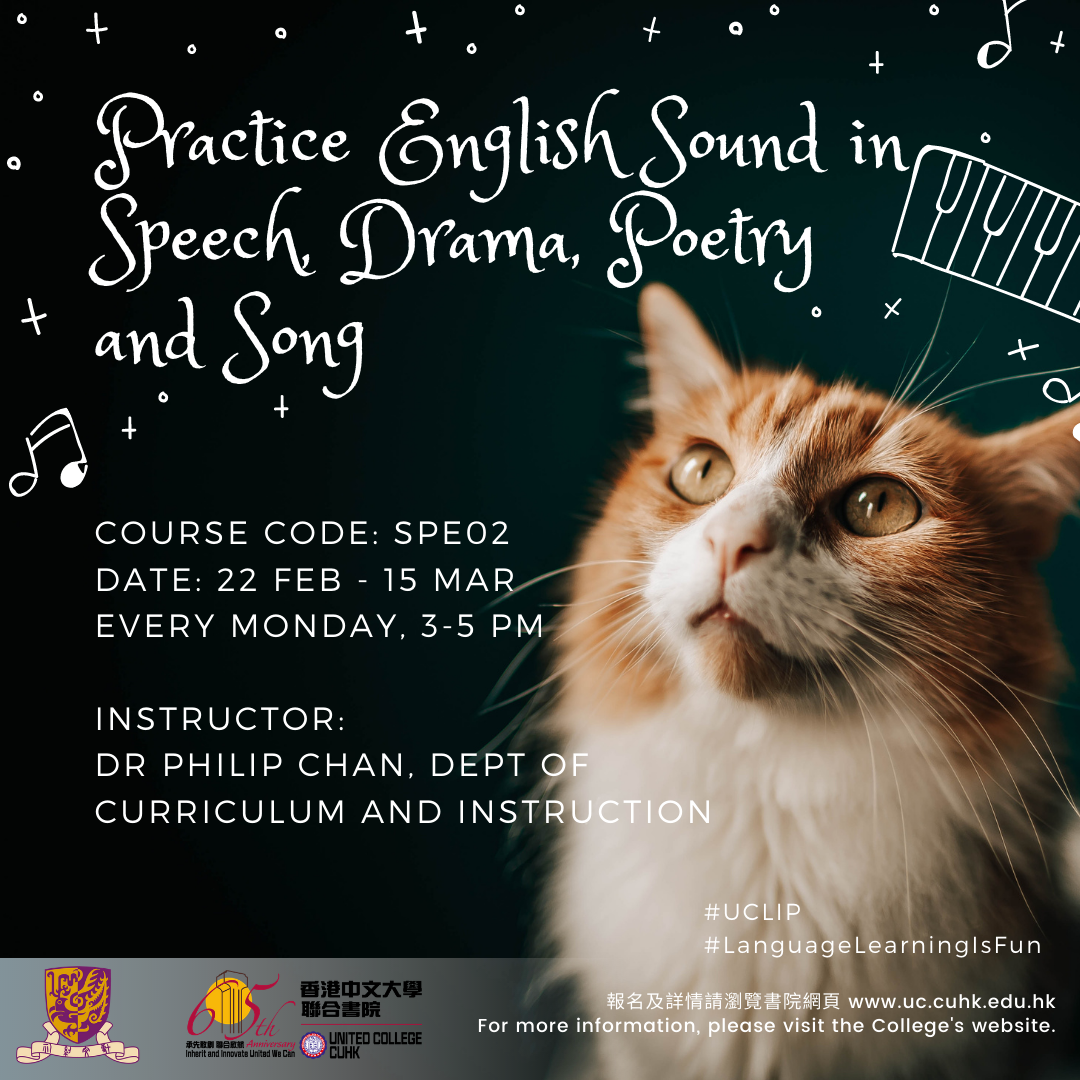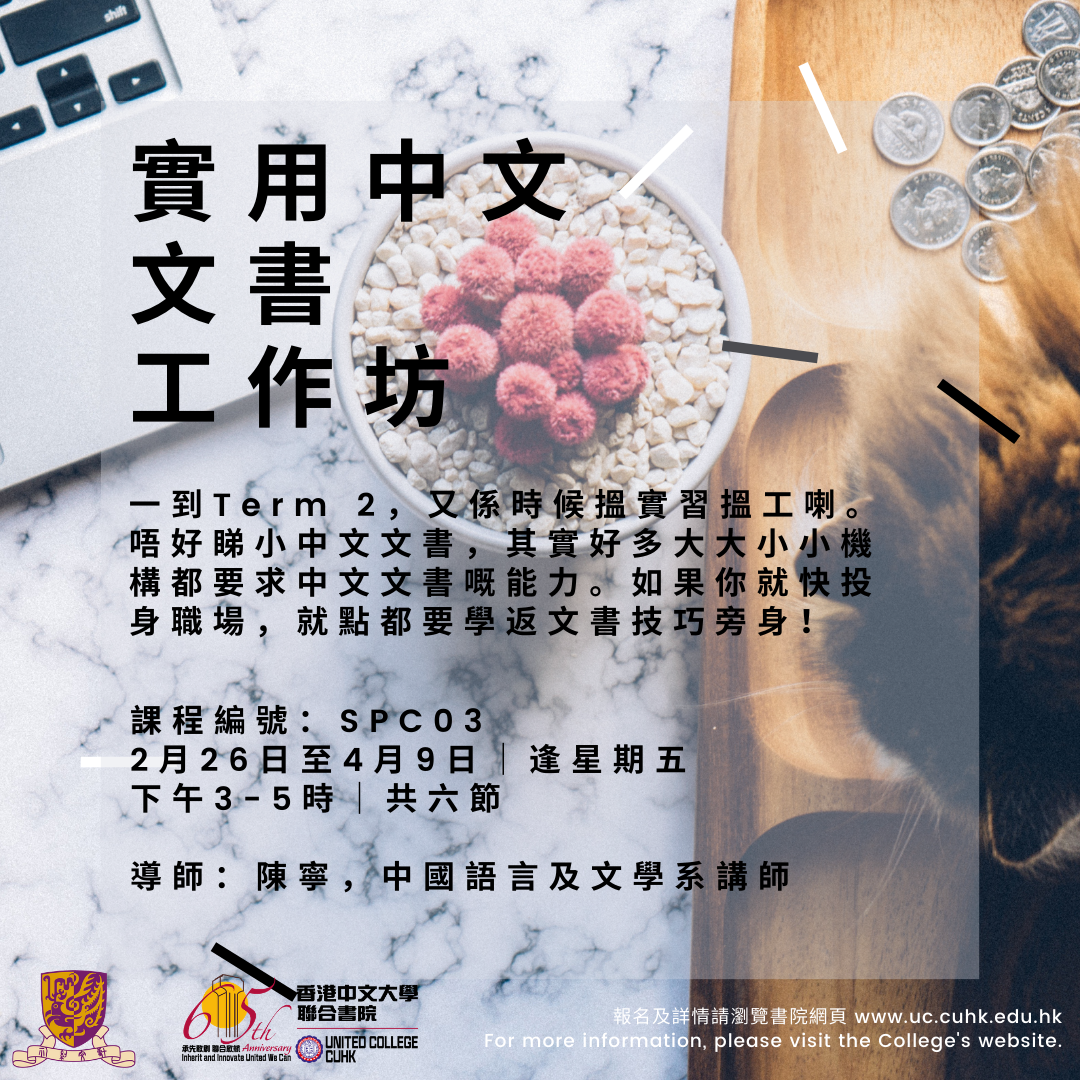本地語文課程
語文改善計劃 — 2021 春季課程
English & Etiquette for Professionals
Course Content
Business Etiquette:
- Why Business Etiquette is Essential
- Tips for Young Workers
- Master the Art of Small Talk in an Event
- Reply an Invitation
- Social Etiquette and the Art of Communications
- The meaning of body language
Personal Image, Code of Dressing & Deportment:
- How to Project a Positive First Impression
- Personal Image
- Formal & Informal Dress Code
The Art of the Table:
- History of Table Manner
- Seating
- Be a Gentleman
- Use of Napkin
- Reading a Menu
- Order in English
- Unacceptable Behaviour
- Tableware Setting
- Use of Cutlery
- Use of Plates
- Use of Glasses
- Basic Non-Verbal Communications
The Elegant Formal English Afternoon Tea
- History of Afternoon Tea
- Afternoon Tea or High Tea
- Food Served in Afternoon Tea
- Afternoon Tea Manner
Be a Proud Chinese
- Etiquette of Chinese Dinner
- Share a Few Chinese Stories in English
A Little Extra about our Foreign Friends
- The Foreigners Palate
- Exotic Food

Practice English Sound in Speech, Drama, Poetry and Song
Course Outline
In this workshop, we will illustrate, practise and perform the prosodic features and functions of English, such as stress, rhythm and intonation. It seeks to scaffold participants to:
- Experience, enjoy and analyse how these features function affectively and pragmatically in connected speech, drama, poetry and song to express and elicit feelings and thoughts, tones and attitudes, and views and values;
- Use these features to effectively communicate with native speakers of English;
- Understand the differences between spoken and written English;
- Understand the differences between English and Chinese, in terms particularly of, the stress-timed rhythm and the syllable-timed rhythm;
- Develop learning how to learn and use English for life creatively through authentic and fun activities.
The workshop will feature a variety of multi-modal materials, and participants are welcome to bring along materials they wish to share for presentation and performance.

English Immersed Experiences
* SPE03 English Immersed Experiences 為校外體驗式課程,由於疫情嚴重及社交距離限制,現時未能落實安排。書院會因應疫情變化另行決定開課日期及報名安排,最遲於三月公布。如同學對課程有興趣,請留意書院公布。
華語電影賞析


創意中文工作坊
創意中文工作坊——小說賞析及創作
導師簡介:
梁莉姿,香港作家。畢業於香港中文大學中國語言及文學系,曾獲文學獎多項,現擔任青年文學獎評判。作品散見文刊。現為香港電台節目《香港文學十三邀2之新生代小說作家》製作人暨主持。著有小說集有《住在安全島上的人》、《明媚如是》,詩集《雜音標本》。另獲第十四屆香港藝術發展獎藝術新秀獎(文學藝術),2020年獲邀為新加坡作家節嘉賓。
主講語言:廣東話
課程簡介:
本課程旨在透過與同學圍讀中外文學小說,以學習小說寫作的基本技巧,另培養同學構思小說內容與經營情節的能力。課堂形式以閱讀、討論及進行寫作活動為主,篇章包括香港、台灣及翻譯文學,同時兼具不同主義及風格,使同學在閱讀過程中,也可發掘出自己喜歡的寫作風格,從而進行彷作練習。
課節名稱及概要:
第一節 甚麼事都沒發生— —小說的可能性
學習重點:小說有甚麼基本元素?這些「元素」是否必需?本節透過與同學們閱讀不同風格的小說作為引入,同時談談「轉折」與「伏線」的鋪墊。
第二節 誰在敲門— —小說的人物與經營
學習重點:人物可以如何捕捉、如何放置?兩個作映襯、三個為對照,抑或群角書寫?如何寫出自然的對話?本節透過閱讀以不同人物數量或設計動機的小說,讓同學認識如何構建人物。
第三節 今天天氣晴— —小說的氣氛及細節
學習重點:在情節及人物以外,小說的氣氛及場景可以怎樣寫?同一個空間,如何賦予不同情感或導向的描述?本節與同學討論有關作品,同時希望讓同學試寫,看看如何渲染小說的氣氛。
第四節 打破第四面牆— —敘事的潛越
學習重點:最後一節,來讀一些「破格」又「好玩」的作品,當敘事者打破第四面牆,直接與讀者對話,背後動機又是甚麼?透過與同學閱讀一些後設小說,由作者與角色對話,讓同學嘗試跳出框框,重新思考作者與作品的虛實關係。

實用中文文書工作
課程綱要︰
本課程旨在介紹常見事務類文書的寫作原則,著重實例分析及訓練,藉此提高學員之寫作能力及表達技巧。
課程目的︰
- 使學員掌握常見事務文書的格式
- 使學員掌握常見事務文書的寫作原則
- 提升學員寫作能力
- 提升學員表達技巧
課程內容︰
- 事務文書格式及用語
- 事務文書例釋及寫作

其他課程
(2021年春季暫不提供)
Fun With Spoken English
Course Outline
Looking for a fun way to practice your spoken English?
This can be achieved through the performance of fun language tasks that mirror real-life situations. You can learn and enjoy learning through engaging in class activities, including games, role plays, and team activities as well as, during one session, interacting with guest native speakers.
Learning will produce
- increased ability to produce English spontaneously in typical situations
- confidence gained from practicing informal English in a small class setting
- new phrases for conversational English
- increased ability to improvise and produce natural sounding English in varying situations
- students will become more relaxed about speaking in English
Public Speaking - How to Get Others to Listen
Course Outline
This course aims to provide students with training in public speaking in English. Specifically, the course is designed to help students in the following areas: to speak with confidence, with substance, with conviction and with clearly defined goal(s); to speak in a style appropriate to the occasion and with suitable gestures and body language; to develop a sense of timing and the appropriate use of pitch and voice qualities; to practice public talks and presentations to targeted audiences.
This course uses the Communication Model to help students learn how to “read” audiences’ needs, in order to present oneself and one’s material in a more persuasive way. That is, students learn to focus on the receivers of the message they intend to send, in order to be able to better convince different audiences by suitably adjusting the message content. Students are given as much chance to practice as possible, preparing their own speeches and role-playing in a variety of common situations. They will be videoed in action, and will get a chance to view the tape of themselves after feedback sessions. Participants can also practice PowerPoint presentations, and learn how to handle I.T. appropriately in presentation.
Special focus will be given to planning and preparation, attention getters and speech structures, use of visual aids and notes, managing nervousness, body language, use of eye contact, and other physical aspects of presentation. Specific topics include presentation of speeches to introduce and welcome a colleague, guest or visitor; impromptu speaking (speaking without preparation); presentations of proposals, speeches to get action, to convince, self-presentation in interviews, meetings and groups, and crisis management, especially when dealing with the media. We will also go off campus to attend a Toastmasters Club meeting, to hear speeches being presented by others.
*Students will need to have quite a good command of English to participate comfortably in this course.
English and Etiquette for Professionals
Course Outline
This course is based on the tutor’s years of experience running management training and student language workshops.
The classes will be highly interactive and we will use experiential learning to build communication skills and learn about everyday professional manners. For example we will have wine in the classroom so that students can learn how to order and drink wine.
- How to connect socially: greetings, keeping the conversation going, different ways to say goodbye
- When a VIP visits: how to welcome guests to a function, go out for dinner afterwards, how to order wine
- Communication: how to speak up but be polite, how to handle sensitive topics, listening
- Groups: problem solving in groups using diplomatic language.
Toastmasters 101: Becoming a Confident English Speaker
This is an activity-based and highly proactive programme in which students will have to interact with each other. The programme emphasizes on listening, understanding and speaking, which are the essential elements for daily life communication. Students are encouraged to participate and prepare for each session.
Course Outline
- Develop good listening skills
- Leave a good first impression
- Formulate ideas off-the-cuff
- Give and receive feedback
- Practise group discussion
- Ask questions to get results
- Sell a product
- Apply skills learned
The Fashion of Fashionable Language
What makes an expression fashionable? In this workshop, students will explore the features of fashionable expressions and the factors generating the language fashion. Building on their existing language proficiency, students will experience the process of creating new expressions through discussing various social and language issues.
Course Outline
- Hong Kong popular language
- The Oxford Word of the Year
- Summary of features of fashionable expressions
- Pop word factory: making new expressions
- Factors driving the language fashion
活學活用普通話
課程綱要
本課程重視普通話的活學活用,在課堂加入普通話教學遊戲,寓學習於活動,從而有效地增加學員的學習興趣,提高學員運用普通話的能力。
課程目的
- 打好基礎︰介紹漢語拼音方案及普通話聲母、韻母、聲調、口語變調、兒化、輕聲等基本而實用的普通話語音知識,為學好普通話打好基礎。
- 避免方言︰針對粵方言區同學獨有的語音、詞彙、語法問題,加以重點修正。
- 活學活用︰通過教學活動,增加學員運用普通話的機會,並提高學員運用普通話的能力。
- 學會學習︰就每個語音專題提供「延伸學習」資料,並加以適當指導,使學員學會自學,使有志進一步學習普通話的學員可以自我改善。
教學活動涵蓋兩方面,一為練習語音;二為練習活用︰
- 針對學生「廣東話說偏一點兒便是普通話」這種誤讀情況,著重聲、韻、調的練習,通過系統生動的教學,糾正學員的讀音問題,加強聽力訓練,改善學員口語準確度,並增加詞匯量。
- 針對學員怯於表達的情況,加入情景對話、配音練習、小組討論、小組或個人遊戲等活動,為學員提供不同的語境,增加學員的參與,使學員感到普通話是活的語言,達到活學活用普通話的目的。
課程內容
- 漢字發音
- 語音矯正
- 聽力訓練
- 常用詞彙
- 普通話、廣東話詞彙比較
- 普通話、廣東話語法比較
- 不同語境的普通話運用
- 專題會話及演講能力訓練



